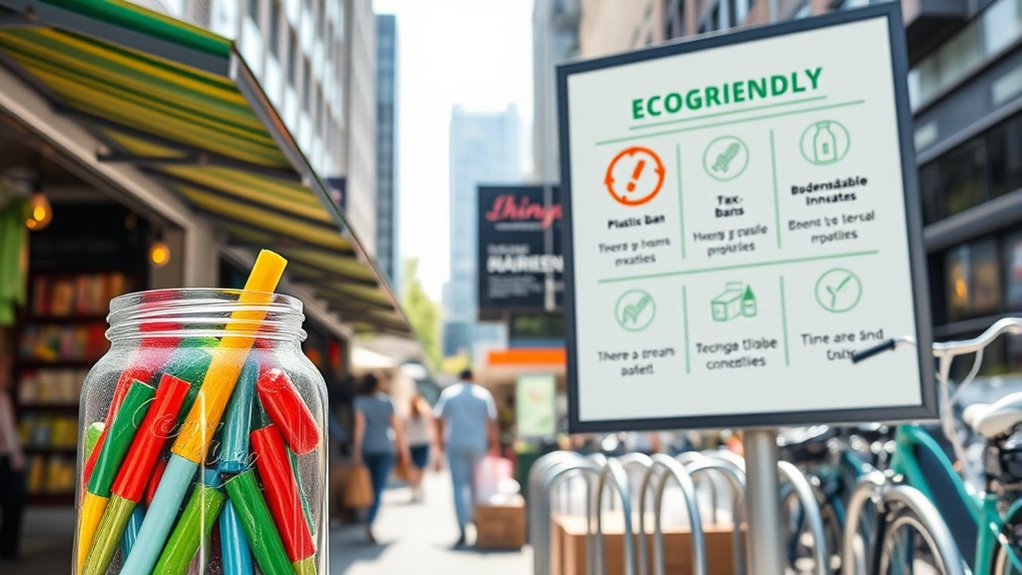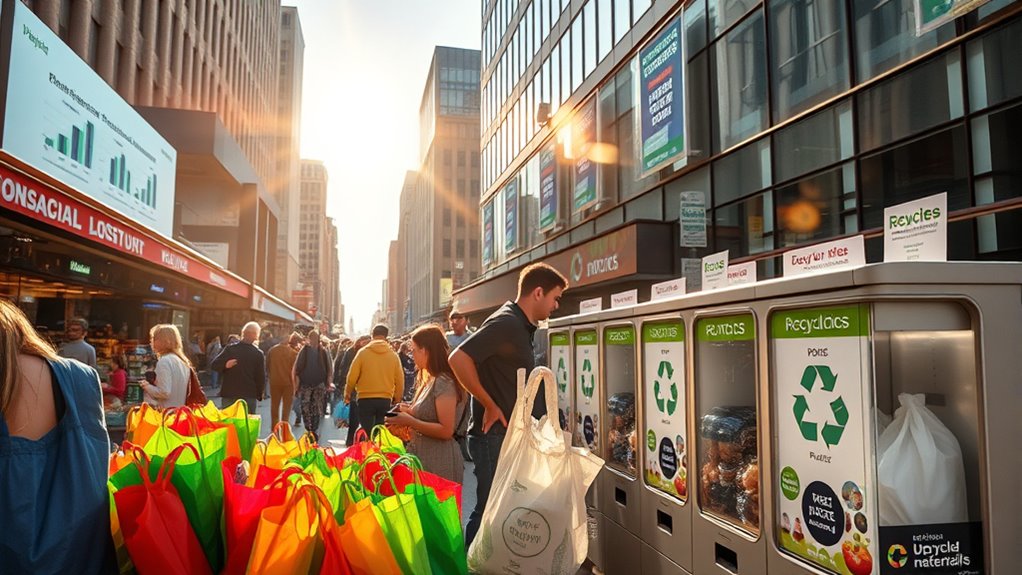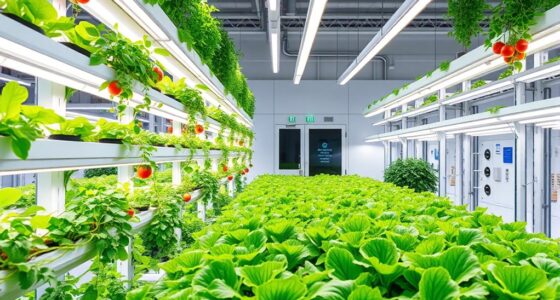Implementing a policy for plastic reduction involves combining bans on single-use plastics, such as bags and straws, with economic incentives like taxes on plastic products. These measures encourage people to choose reusable and eco-friendly options while generating funds for recycling and education programs. Supporting innovation in biodegradable and reusable alternatives also plays a key role. If you’re interested in how these strategies work together to create real impact, there’s much more to explore below.
Key Takeaways
- Implement bans on single-use plastics and promote biodegradable and reusable alternatives to reduce plastic waste.
- Introduce taxes on plastic products to discourage use and fund recycling and educational initiatives.
- Establish accessible recycling centers with clear labeling to facilitate proper sorting and reuse.
- Promote innovation in eco-friendly packaging and sustainable product development through supportive policies.
- Combine regulatory measures, economic incentives, and public education for comprehensive plastic reduction strategies.

Have you ever wondered how policies can effectively reduce plastic waste? It’s a question many of us ask as we see mountains of discarded plastic piling up in landfills and oceans. The truth is, well-crafted policies play a crucial role in shaping your behavior and the behaviors of others around you. One of the most impactful strategies involves implementing recycling initiatives that make it easier and more appealing to sort and reuse plastics. These initiatives often include establishing more accessible recycling centers, introducing clear labeling systems, and encouraging businesses to adopt sustainable packaging. When recycling becomes simple and convenient, you’re more likely to participate actively, which reduces the amount of plastic ending up in the environment.
Effective policies like recycling initiatives encourage active participation and reduce plastic waste.
But policies alone don’t work unless you understand why reducing plastic waste matters. That’s where consumer education comes into play. Governments and organizations are increasingly investing in campaigns that inform you about the importance of reducing plastic consumption, how to properly recycle, and the environmental consequences of neglecting these practices. When you’re educated about the impact of plastic pollution, you’re more motivated to change your habits—like refusing single-use plastics or choosing products with minimal packaging. Educating yourself about environmental impact transforms awareness into action, empowering you to make smarter choices that support plastic reduction efforts.
In addition to recycling initiatives and education, policies often include bans on certain single-use plastics, which send a clear message about what’s no longer acceptable. These bans can phase out items like plastic straws, bags, and utensils, pushing you towards alternatives that are biodegradable or reusable. Such measures not only curb waste but also stimulate innovation as manufacturers develop new eco-friendly products. You might find yourself switching to reusable bags or metal straws without even thinking twice, because policies make those options more accessible and socially acceptable. Promoting sustainable alternatives encourages the development and adoption of environmentally friendly products that can replace traditional plastics. Moreover, understanding the role of policy enforcement is vital, as it ensures that regulations are effectively implemented and adhered to, increasing their impact.
Taxes on plastic products further reinforce these efforts by making plastic items less financially attractive. When you see a small tax added to plastic bags or bottles, it nudges you to think twice before purchasing them. These taxes encourage you to bring your own reusable bags or containers, fostering a culture of sustainability. The revenue generated often funds recycling programs and consumer education campaigns, creating a cycle that benefits everyone. Moreover, such taxes can incentivize businesses to innovate and offer more eco-friendly packaging solutions, aligning economic incentives with environmental goals.
Ultimately, policies for plastic reduction rely on a combination of these strategies—recycling initiatives, consumer education, bans, and taxes—to create an extensive approach. When each element works together, they not only influence your choices but also shape broader societal habits. By understanding and supporting these policies, you become an active participant in reducing plastic waste and protecting the environment for future generations. Recognizing the importance of behavioral change can significantly enhance the effectiveness of these policies. Additionally, the success of these policies depends on continuous public engagement and feedback to adapt strategies effectively.
Frequently Asked Questions
How Effective Are Plastic Bans Compared to Taxes?
You might find plastic bans more effective than taxes because bans directly eliminate problematic plastics, encouraging recycling incentives and reducing waste. However, taxes can motivate behavior change through cost incentives, raising public awareness about environmental impacts. While bans often lead to immediate reductions, taxes foster long-term shifts in consumer habits. Both strategies can work best when combined, complementing each other to maximize plastic waste reduction and promote sustainable practices.
What Are the Economic Impacts of Plastic Reduction Policies?
You might find that plastic reduction policies impact your economy through changes in manufacturing costs and recycling infrastructure investments. These policies can increase costs for producers, but also stimulate innovation and job creation in recycling and sustainable materials. While some businesses face short-term expenses, long-term benefits include a cleaner environment and more efficient waste management. Overall, these policies balance economic growth with environmental responsibility, encouraging sustainable development.
How Do Plastic Reduction Policies Affect Developing Countries?
Imagine your country struggles with plastic pollution, affecting local communities’ health and environment. Plastic reduction policies can sometimes burden developing nations with economic challenges, but they also promote environmental justice by reducing waste and pollution. For example, some countries might face increased costs or limited access to alternatives. You need balanced strategies that support sustainable growth while tackling plastic pollution, ensuring marginalized populations aren’t left behind.
What Role Does Consumer Behavior Play in Policy Success?
You play a vital role in policy success through your consumer behavior. When you’re aware of plastic’s environmental impact, you’re more likely to choose sustainable options. Your actions, influenced by social norms and peer pressure, can drive demand for eco-friendly products. Increased consumer awareness and social influence motivate businesses and policymakers to implement effective plastic reduction strategies, creating a positive cycle that accelerates environmental benefits.
Are There Alternative Materials to Plastics Being Promoted?
Did you know that over 60% of consumers prefer products with biodegradable alternatives? You can choose sustainable packaging options, which are increasingly promoted as eco-friendly alternatives to traditional plastics. These materials break down more quickly and reduce environmental impact. By supporting brands that prioritize biodegradable alternatives, you help drive demand and encourage innovation in eco-friendly packaging solutions, ultimately contributing to a significant reduction in plastic waste.
Conclusion
By embracing bans, taxes, and innovative solutions, you hold the power to turn the tide against plastic pollution. Think of these policies as the keys to a cleaner, greener future—unlocking change with every action. Your choices can be the spark that ignites a global movement, transforming waste into a thing of the past. Together, you can be the force that shapes a sustainable world, where plastic pollution becomes just a distant memory.









